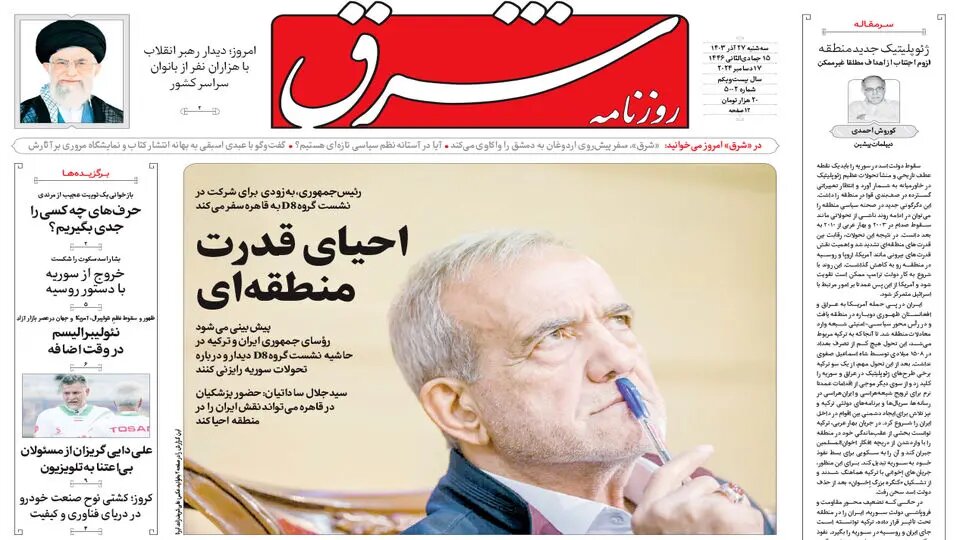The new geopolitics of the region

TEHRAN - The Sharq newspaper says the fall of the Assad government in Syria should be considered a historical turning point that would trigger huge geopolitical changes in the Middle East, and we should expect extensive changes in the alignment of power players in the region.
The weakening of the Axis of Resistance and the collapse of the Syrian government have affected Iran’s influence in the region and this has enabled Turkey to take the place of Iran and Russia in Syria. It is also possible that Turkey would focus on the Caucasus, specifically on the so-called Zangezur Corridor and the violation of Armenian sovereignty in Sivnik province. The fact that Russia is aligned with Turkey and Baku adds to the volatility of the situation. Moreover, Turkey's relations with America and Israel have always made Ankara's hands open for all kinds of maneuvers in the region. The secret of Turkey's success is a focus on possible goals, while Iran has focused on absolutely impossible goals. While Iran should support stability in Syria where everyone is interested, it can also take advantage of the gaps in the region to protect its interests. There is a need for foreign policy priorities. Iran should be patient in setting its foreign policy goals and, like other middle powers, avoid focusing on distant and impossible goals and focus on goals related to its interests.
The real goal of Zionists' claims
In a note, Jam-e-Jam addressed the commotion created against Iran and wrote: One of the uproars that was started by the Zionists against Iran, especially after Operation True Promise, is the presence of an unprecedented number of Iranian spies inside the occupied territories to collect information about Zionist regime’s military. But to advance this news story, Israel has had to admit the success of the True Promise I and II operations. The publication of these reports is intended to divert public opinion from the obvious failure of the regime’s anti-missile system to counter the barrage of missiles raining down on Israel by Iran. Experts believe that the purpose behind publishing such reports on the American-Israeli side is to justify the failure of their anti-missile system by Iranian missiles. They have other goals in mind. This comes while the world extremely hates Netanyahu for his crimes especially as the Hague-based International Court of Justice has issued an arrest warrant against him and his former defense minister. Therefore, publishing such news in the current conditions is an attempt by the Zionist regime to justify its crimes in Gaza, Lebanon, and Syria.
Hamshahri: Psychological war against Iran
In an article, Hamshahri addressed Tel Aviv's new project against Tehran and said: Abusing the recent developments in Syria to launch a psychological war against Iran has become one of the main policies of the Zionist-Western officials and their media outlets. Following the recent developments in Syria, some Zionist media and decision-makers seek to insinuate that now is the best opportunity to attack Iran's nuclear facilities, because regional developments have put Iran in a weak position. The truth is that although recent developments in the region have managed to separate Syria from the Axis of Resistance, this does not mean a weakening of Iran's strategic ability to its ability to respond to any threat from the Washington-Tel Aviv axis. The other side is well aware that Tehran has different options to respond to any military threat, and that the two "True Promise" operations are only a part of Iran's strategic ability to face threats.
Iran: 2 strategic paths
The Iran newspaper points to the Islamic Republic’s return to the South Caucasus and the expansion of its influence throughout the large Black Sea region and this originates from 2 strategic goals that have emerged following the development of two mutual transit corridors. The first strategic goal is to strengthen closer relations with Russia. The two countries are cooperating through the International North–South Transport Corridor (INSTC), which connects India to Russia via Iran and Azerbaijan and serves as an alternative to the longer and more expensive route through the Suez Canal. The importance of this transit route has increased due to the severe sanctions imposed on Iran and Russia. The second strategic goal is to strengthen access to the rich European market. To achieve this goal, Tehran is developing the Persian Gulf-Black Sea international transit corridor. It is a multipurpose route that connects Iran to EU member states such as Bulgaria or Romania through Armenia, Georgia, and the Black Sea.
